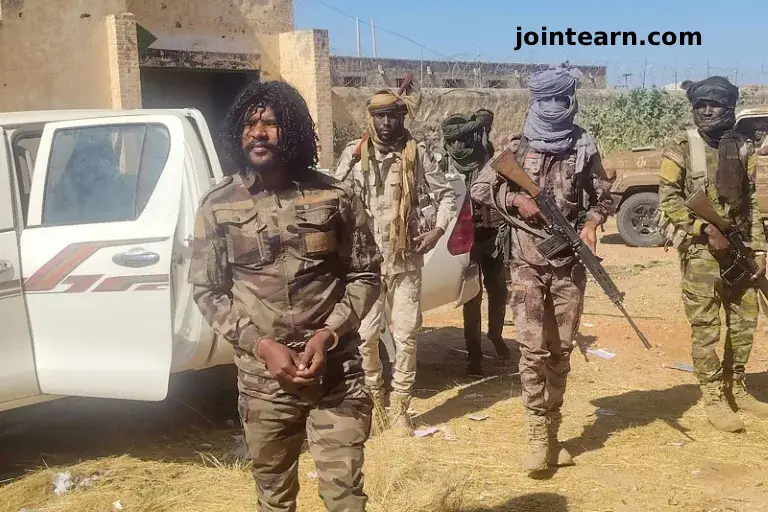
The Rapid Support Forces (RSF), Sudan’s powerful paramilitary group, announced that it has arrested several of its own members accused of committing war crimes and atrocities during the recent seizure of El-Fasher, the last major stronghold of the Sudanese army in western Darfur.
The arrests come amid a mounting international outcry over reports of mass killings, executions, and ethnic violence committed after the RSF’s takeover, as well as the worsening humanitarian crisis in both Darfur and the neighboring Kordofan region.
RSF Confirms Arrests After Graphic Videos Emerge
In a statement late Thursday, the RSF said it had detained several fighters accused of “violations that occurred during the liberation of El-Fasher,” including a man identified as Abu Lulu, who appeared in multiple verified videos committing summary executions.
In one clip authenticated by AFP, Abu Lulu was filmed shooting unarmed civilians at close range. Another video showed him standing triumphantly among bodies and charred vehicles.
The RSF released footage purportedly showing Abu Lulu in custody inside a North Darfur prison, pledging that he would face trial. “Abu Lulu is arrested and will be brought to a fair trial according to the law,” one RSF spokesperson declared in the video.
The group insisted it adheres to “the law, rules of conduct, and military discipline,” emphasizing that the abuses do not represent its official policy.
Survivors Describe Atrocities in El-Fasher
Since the RSF’s capture of El-Fasher on Sunday, survivors who fled to the nearby town of Tawila have described mass executions, sexual violence, looting, and indiscriminate shootings. Civilians were allegedly targeted as they tried to escape, with children reportedly killed in front of their parents.
“People were slaughtered in the streets. Many families were separated during the chaos,” one survivor told AFP.
The United Nations estimates that more than 36,000 people have fled El-Fasher since its fall, while 177,000 civilians remain trapped inside the city with no access to food, medicine, or communications. Satellite imagery analyzed by Yale University’s Humanitarian Research Lab shows “clusters consistent with adult human bodies” and potential pools of blood across several neighborhoods.
UN: “The Horror Is Continuing”
At an emergency UN Security Council briefing, Tom Fletcher, the UN humanitarian chief, warned that the “horror is continuing” in Sudan. “We cannot hear the screams, but credible reports point to widespread executions, rapes, and mutilations,” Fletcher said.
He added that while the RSF claims to be investigating its fighters, there are “serious doubts about its commitment to justice,” given the group’s long record of impunity.
Martha Pobee, the UN Assistant Secretary-General for Africa, echoed similar concerns, citing “large-scale atrocities” in both Darfur and North Kordofan. Pobee warned that the conflict’s territorial scope is expanding, endangering millions more civilians.
Ethnic Violence and Repeated Patterns of Abuse
Analyst Kholood Khair told AFP that the RSF’s latest atrocities reflect “a disturbing repetition” of ethnic violence reminiscent of the Darfur genocide two decades ago.
“We expect these atrocities to continue, particularly against non-Arab groups such as the Zaghawa, Fur, Berti, and Masalit,” she said.
The RSF, descended from the Janjaweed militias responsible for widespread massacres in the early 2000s, has again been accused of ethnic cleansing. In 2023, the group was blamed for killing up to 15,000 members of the Masalit community in El-Geneina, West Darfur.
Conflict Expands to North Kordofan
Beyond Darfur, violence has now spread into North Kordofan, where 35,000 civilians fled five towns this week following RSF attacks.
Reports from humanitarian groups indicate reprisals against suspected collaborators, many of which are ethnically motivated. The UN confirmed that at least 50 civilians, including five Red Crescent volunteers, were killed in recent days in Bara, a key town north of El-Obeid.
Analysts warn that Kordofan may become the next major front in Sudan’s civil war. “It’s clearly going to be the next area of military escalation,” said Khair.
The RSF also accused the Sudanese army of launching a drone strike on a school in eastern North Kordofan, alleging that dozens of students and teachers were killed — an accusation the army denies.
The Wider War and Humanitarian Crisis
Sudan’s civil war erupted in April 2023 following a power struggle between the RSF, led by Mohamed Hamdan “Hemedti” Dagalo, and the Sudanese Armed Forces (SAF). The conflict has killed tens of thousands, displaced over 12 million people, and left nearly half the population in urgent need of aid.
The RSF now controls most of western Sudan, including all five Darfur state capitals, effectively splitting the country along east-west lines. The army retains control over the north, east, and central regions, including the capital, Khartoum.
The United States and other international observers have accused the RSF of committing war crimes and acts of genocide, while humanitarian agencies warn that famine, disease, and total economic collapse loom.
Calls for Accountability and Ceasefire
Global rights organizations, including Human Rights Watch and Amnesty International, have called for an independent investigation into atrocities in El-Fasher and elsewhere in Darfur.
UN officials stress that both the RSF and the army have been accused of serious violations, including indiscriminate bombing, sexual violence, and the targeting of civilians.
“Sudan is descending into a catastrophe that could rival the horrors of the early 2000s unless the world acts decisively,” Fletcher warned.


Leave a Reply